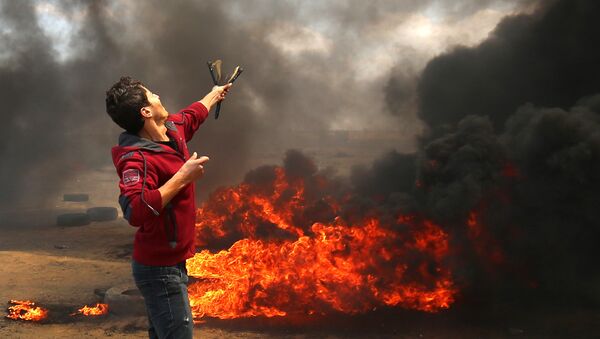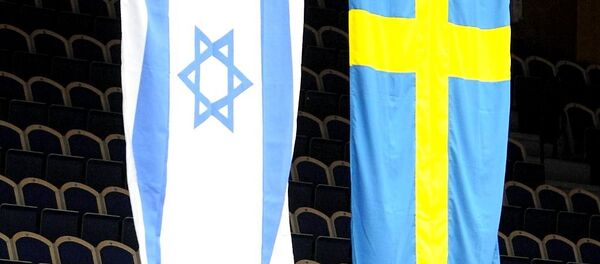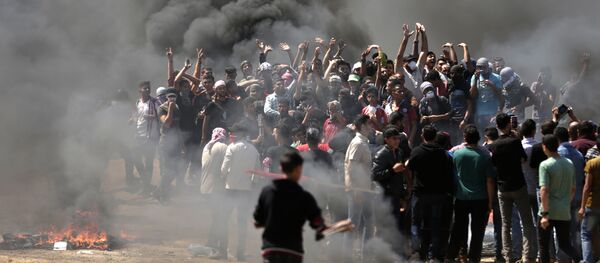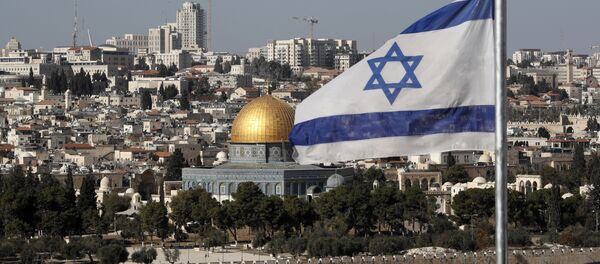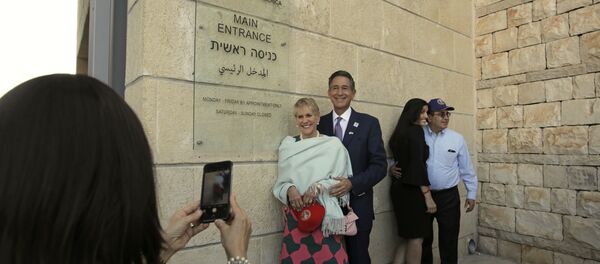The May 14 opening of the US Embassy in Jerusalem has prompted polarized responses: While some observers are voicing concerns over Donald Trump's controversial move, others suggest that the decision is unlikely to exacerbate further tensions in the already war-torn Middle East.
Speaking to Sputnik, the director general of the Russian International Affairs Council (RIAC), Andrei Kortunov, opined that the White House's move was premature and counterproductive: The embassy transfer may seriously irritate America's Arab allies and complicate Israel's cooperation with Saudi Arabia, let alone the further radicalization of the Palestinian movement, he noted.
"I believe that both the United States and the government of Benjamin Netanyahu, who insisted on such a decision, have made a mistake," Kortunov said. "The symbolic meaning of the gesture is quite understandable, for Israel this is important, but it will play a clearly destructive role in regional politics."
"Additionally, [Trump] behaves in a shocking way which is typical of him: He never misses a chance to demonstrate his independence, unpredictability and perseverance in pursuing his goals," he added.
Timofey Bordachev, the director of the Center for Comprehensive European and International Studies at Russia's National Research University Higher School of Economics, presumed that one should not overdramatize the situation.
"On the one hand, the transfer of the embassy shows that old rules and regulations no longer work," he suggested. "On the other hand, it was done at the right time, since in the context of Syrian events, the conflict between Israel and Iran and the Russian-American confrontation, nobody cares about the fate of Jerusalem and the unfortunate Palestinians."
On May 14, Washington officially recognized Jerusalem as Israel's capital by moving the US Embassy there.
While Trump's daughter Ivanka Trump, her husband Jared Kushner, Treasury Secretary Steven Mnuchin and other high-ranking US politicians were taking part in the opening ceremony, protests erupted on the border of the Gaza Strip.
The protesters threw Molotov cocktails and rocks at Israeli soldiers amid violent clashes on the border with the Gaza Strip, which resulted in more than 2,500 Palestinians being wounded and 59 killed, including an 8-month-old child, according to the Palestinian Health Ministry.
On March 30, the Great March of Return kicked off along the Gaza border ahead of the 70th anniversary of the establishment of Israel, which the Arabs living in the region call "the Nakba," ("catastrophe") as it resulted in the forcible departure of hundreds of thousands of Palestinians.
Speaking to Sputnik, Gaza Healthcare Ministry spokesman Ashraf Qidra revealed that since March 30, 104 Palestinians have been killed and over 12,000 others injured by the Israeli forces.
However, it was relatively calm in Jerusalem on May 14, according to Benny Briskin, a former aide to the Israeli prime minister: "There were very few people on the streets — everyone was watching the opening ceremony of the [US] embassy on TV. [There were] no demonstrations. Of course, additional security measures were taken — [the authorities] were very well prepared for this day."

"Turkey will react to this harshly. We have withdrawn our ambassadors from Washington and Tel Aviv for consultations. We also propose to convene an emergency meeting of the UN Security Council. We will hold talks with many leaders," Erdogan stated Monday.
On May 15, Turkish Prime Minister Binali Yildirim urged Muslim countries to reconsider their ties with Israel in light of the recent border clashes in Gaza.
The Republic of South Africa followed Ankara's suit and recalled its ambassador from Israel.
For its part, the EU called upon parties involved to show restraint, drawing attention to the role of Hamas, a Palestinian militant group, during the protests.
"Israel must respect the right to peaceful protest and the principle of proportionality in the use of force. Hamas and those leading the demonstrations in Gaza must ensure that they remain strictly non-violent and must not exploit them for other means," the EU statement said.
Earlier, Moscow signaled its concerns over the opening of the US Embassy in Jerusalem, stressing that the move could increase regional tensions.
Trump's decision to recognize Jerusalem as the capital of Israel was announced in December 2017 prompting a storm of criticism from international observers as well as fierce protests in the Arab world.
The US Congress passed the so-called Jerusalem Embassy Act envisaging the relocation of the US Embassy in Israel from Tel Aviv to Jerusalem no later than May 31, 1999, in 1995. However, American presidents hesitated to sign the act into law due to Washington's uneasy relations with the Arab world.
The views of the contributors do not necessarily reflect those of Sputnik.

